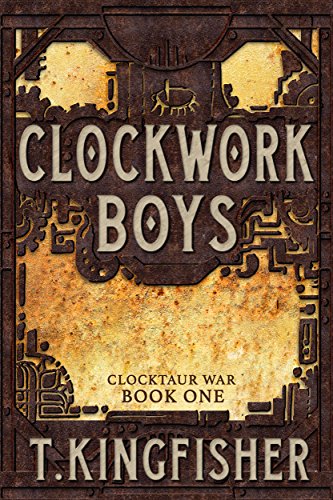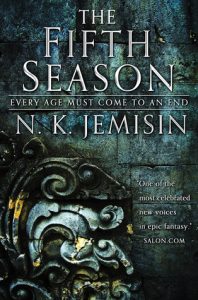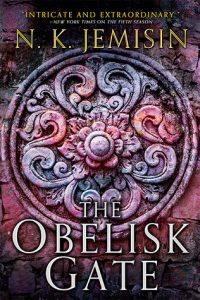A while ago, a friend of mine and I toyed with the idea of writing a novel based upon our role playing experiences. So far, we haven’t made much progress. However, I wrote a few short stories that are attempts to develop background material for that eventual novel. This is one of those stories, which I also had put up on my personal site, but I thought I’d share it here as well. This was originally written on March 27, 1996.
***
Tarn peaked from the top bunk down at his cell-mate, Halferd the dwarf. The dwarf’s face was still wet from his evening shave. He was lying on his back, his eyes closed, some ancient dwarven hymn rumbling in his chest.
“Halferd?”
The dwarf opened his right eye and glanced up at Tarn. “Yes, kid?”
“Why are you here?”
“What do you mean, why am I here? The gods made it so. How am I supposed to know why they do what they do?”
“No, I mean here, in the dungeon. How did you end up here?”
“Oh, I see. Well, it all started a while back. A long time ago as humans count time, but it seems like yesterday to me…”
***
There was a knock at the large wooden door that served as the enterance to the king’s chambers. The king was sitting behind a large stone desk. His face was thin and creased. His red beard was dull and streaked with grey. He coughed as he talked with his closest advisor, an old dwarf with a long white beard, who sat in the corner.
“Come.” called the king.
The door opened. In stepped Halferd, captain of the king’s personal body guards. He was a powerfully shaped creature with arms as thick as any man’s legs. His bright yellow beard flowed down across his chest, past the belt that carried his warhammer. On his back was strapped his weapon of choice: a Durinian heavy crossbow.
“You asked for me, sire?” asked the body guard.
“Yes, old friend. Please, come in.” The king waved over to his advisor. “Nurid and I want to discuss something with you.”
Halferd entered and sat down opposite the king.
“You don’t look too good, sire. Are you ok?”
“Please, Halferd, call me Relin. We’ve been friends too long to go by this royal protocal bullshit. And no, I’m not doing too well. That’s part of the reason we’ve called you here today.”
“I see, Rel.”
“Nurin, would you explain the situation to Hal?”
“Of course, Relin.” The old dwarf stood up and walked around the room. “Halferd, as you no doubt have noticed, there has been a lot of tension in the air lately. Some of the clans have complained about their economic state and equal representation in the Hall of Warriors.”
“Yeah, I’ve noticed. It seems like civil war could break out at any time out there.”
“Precisely. We have reliable sources that tell us that Noruk, the leader of the Diamond clan, and Slan, leader of the Lead clan, are just about to forge an alliance and try to over throw the king.” Nurin nodded to Relin.
“I see.” said Halferd. “If that happens, the kingdom will be, for all intents and purposes, destroyed.”
“Correct, Hal,” replied Relin, his voice a heavy rasp. “However, Nurin and I think we’ve come up with a plan and we need your help.”
“Whatever I can do, Rel. You know I’m behind you.”
“As I had hoped.”
“Being king has taken a heavy toll on Relin,” continued Nurin. “He’s become frail and sick, and will probably die soon.”
“Is this true?” Halferd asked, looking to his friend.
“I’m afraid so, Hal. What’s more, I fear that my wasting away will give Noruk and Slan the perfect opportunity to stage their revolt. Therefore, Nurin and I have decided that I must die in a… let’s say more dramatic way.”
“Yes, Hal. The king and I believe that if he is assassinated, it might be the kind of thing that can unite all of us against a common enemy. And it just might stop any civil war.”
“What? Who is going to assassinate you? You are the only thing that is keeping everyone from revolting. It’s their loyalty and respect of you that is keeping them at bay! Who would do such a thing?”
Relin looked into the eyes of his old friend. “You, Halferd.”
“Me?”
“Yes,” replied Nurin. “We have been relying on your loyalty to the king to help us carry out our plan.”
“You mean to murder the king.” Halferd eyed Nurin suspiciously. “And what do you get out of this, Nurin?”
“Nothing,” replied Relin. “He will die too.”
“I see. Are you sure that this is the best way?”
“It is the only way that we can see,” said the king, sighing as he reclined in his chair.
“I still don’t know.” said Halferd. “I don’t know if one solitary assassin would be target enough for all of the people to turn their hatred towards.”
Nurin sat down on the corner of the desk. “We don’t think so either,” he said. “That’s why the rest of the Royal Body Guard is going to help you.”
“They’ll never do it!”
The king coughed. “We’ve already talked to them, Hal. They don’t know the details, but they are willing to help. They know the consequences. More than likely, they will all be executed when they are caught. It is you, the leader of the traitors, who will receive the harshest sentence.”
Halferd whispered under his breath. “Exile.”
“Exactly. I know I am asking a lot from you, Hal, but I see no other way. We’ve been running over scenarios for almost half a year, and this seems the most plausible. What do you say?”
Halferd looked at the king, a mixture of fear, resignation, and pain in his eyes. “You already know my answer. That’s why you asked me here in the first place.”
“Thanks Hal. Know that, even though the kingdom will never know what you are about to do for your people, I do, and I thank you.”
Nurin walked over to a cabinet and grabbed some scrolls. He handed them to Halferd. “These are the details of the plans for the assassination. Your men don’t know about these, so you will have to fill them in. You need to make sure these are destroyed before anything actually happens. The last thing we need is the revelation that this was all planned by us.”
“Of course,” said Halferd. He took the scrolls and stood up, turning toward the door.
“Hal?”
“Yes, Rel?”
The king stood up and walked over to his friend. The weight of his office was obvious as the dwarf’s body hunched over as he walked. He stood infront of Hal.
“I’m really sorry I have to ask you to do this. I hope you understand.”
“I do, Rel.”
The two men hugged each other. Then, quickly, Halferd opened the door and left, a tear running down his cheek.
***
“Well, Tarn, after that, things went pretty fast. My men and I were supposed to storm the throne room when the general of the army was away. It was his role, unbeknownst to him, to capture us after the assassination. The king has already named his son successor several years before. However, his son wasn’t all that popular, so he was also one of our targets. The king figured that, if his successor was killed, Hagorn, the general, would probably be named king, and everyone felt that the people could rally behind Hagorn, especially if he was a hero for capturing the traitors.
So, during one of Hagorn’s excursions, while the king and some of his advisors were discussing the chances of war with the orks, my men and I went into action. We were, of course, present in the room, being the body guards of the king. There were five of us. I gave the signal and two of them immediately ran to the royal family’s quarters to kill the king’s wife and two daughters. I don’t know if the king had told them about the plan, but he felt that we had to do this in order to make the assassination that much more tragic and rally the people that much more. His son and brother-in-law were in the throne room along with several of their other advisors, including Nurin. As the three ran off, one closed the doors to the throne room and bolted it shut. The two other men, one of which was a good friend of mine named Jugad, and I swiftly went at the advisors. It didn’t take long to kill them all, since none of them were armed, relying on us to protect them. Soon, only Nurin, the king, and his son were left. Jugad smashed the king’s son upside the head with his morning star, splattering his brains all over the king’s bright white robe. The king didn’t even blink. It was my duty to kill Nurin and the king. The two men sent to take care of the royal family returned, their weapons covered with blood. Both the king and Nurin nodded. I took my crossbow and notched two bolts. I aimed and fired one into the middle of Nurin’s head. The poison I had put on the bolt killed him instantly and painlessly. Then I aimed the other at the king. I stared down the bow, right into the eye my friend. I pulled back for a moment, letting the bow hang in my hand on my side. I looked at the king for a moment. I saluted him. My men followed my example and saluted him as well. The king, a tear running down his cheek, looked at us. I raised the bow again as the king returned our salute. The bolt flew across the room, piercing the chest of my friend, puncturing his heart and causing it to explode. The pain was intense but brief.
It wasn’t long before Hagord returned and broke into the throne room. We were vastly outnumbered and two of my men died in the storming. Soon, we were all captured and taken away. As we were pushed along the road running through the main cavern, through the crowd of people who had come to see what was going on, I saw my wife. She looked at me, and turned away, not saying a word. That was the last I ever saw of her.
We were taken to the central market, where we were quickly tried and convicted. They shaved the beards off of everyone of us, a sign of shame for the crime we had committed. As the king had predicted, all of my men were sentenced to death, all except me. I was exiled. They made me watch as my men were bound to gigantic boulder which had an axel running through the middle. Fifty men got on each side and pushed on the axel, making the boulder roll and crush my men. The crunch of their bones, the imploding of the skulls filled the air, but they never cried out.
I received the harshest sentence: exile from the dwarven kingdom. It is hard for you humans to understand this, but our caverns and caves are everything to us. Being forced above ground is the ultimate punishment for us, even worse than death.
After that, I wandered around. At first, I was a body guard to some merchants, then a bouncer at a dive of a bar in the city. Eventually, about fifty years after I had been exiled, I made it here. There was word that miners were wanted, men to excavate tunnels. I relished the chance to dig in the dirt again, to be underground, to be surrounded by solid earth on all sides. I came and was hired. It wasn’t long after that my employer revealed his true colors and imprisoned me down here, to work as his slave. You know the rest.”
There was a silence as Tarn digested what his friend had just told him. After a short while, he finally spoke up.
“Hal, can I ask you another question?”
“What’s that?”
“If having a cleanly shaved face is a sign of shame for your people, why do you still keep it that way?”
“For me, it’s not a sign of shame. For me, it’s a badge, a symbol of the loyalty my men had for me and that we all had for the king and the kingdom. It’s the least I can do for my men, in remembrance of them. Now get to sleep, Tarn. We have a lot of work to do.”
The dwarf rolled over to his side and soon was snoring loudly, loud enough to get yells from some of the other cells. Tarn just stared at the dark ceiling, wondering about the life of his friend, thinking that really, his life hadn’t been so tough.
Like this:
Like Loading...



